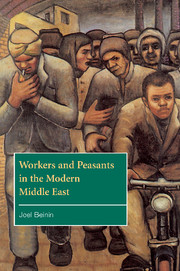Book contents
- Frontmatter
- Contents
- List of tables
- Acknowledgments
- Glossary
- List of acronyms and abbreviations
- Map 1: The Ottoman Empire, 1699–1914
- Map 2: Egypt and Bilad al-Sham
- Map 3: The Middle East in the twentieth century
- Introduction
- 1 The world capitalist market, provincial regimes, and local producers, 1750–1839
- 2 Ottoman reform and European imperialism, 1839–1907
- 3 The rise of mass politics, 1908–1939
- 4 Fikri al-Khuli's journey to al-Mahalla al-Kubra
- 5 Populist nationalism, state-led development, and authoritarian regimes, 1939–1973
- 6 Post-populist reformation of the working class and peasantry
- Notes
- References
- Index
4 - Fikri al-Khuli's journey to al-Mahalla al-Kubra
Published online by Cambridge University Press: 03 February 2010
- Frontmatter
- Contents
- List of tables
- Acknowledgments
- Glossary
- List of acronyms and abbreviations
- Map 1: The Ottoman Empire, 1699–1914
- Map 2: Egypt and Bilad al-Sham
- Map 3: The Middle East in the twentieth century
- Introduction
- 1 The world capitalist market, provincial regimes, and local producers, 1750–1839
- 2 Ottoman reform and European imperialism, 1839–1907
- 3 The rise of mass politics, 1908–1939
- 4 Fikri al-Khuli's journey to al-Mahalla al-Kubra
- 5 Populist nationalism, state-led development, and authoritarian regimes, 1939–1973
- 6 Post-populist reformation of the working class and peasantry
- Notes
- References
- Index
Summary
Despite this book's focus on workers and peasants, their voices have made only minor appearances in the text so far. In part this is because a synthetic overview of any subject, by attending to “the big picture,” is predisposed to emphasize large-scale structures and historical trends at the expense of microsocial histories which might allow more scope for subaltern voices. It is also because working people were commonly illiterate before the twentieth century and have left very few records. Often, the best that can be done is to reconstruct their presence in historical processes through the reports of elite and middle-class sources. Even when working people gained access to education in the late nineteenth and twentieth centuries, the great majority of those who did record their experiences and understandings of the world around them did so using the language and conceptual categories of modernist, nationalist, or religious elites.
There are many published autobiographies and labor histories by trade union leaders demonstrating that they were not simply manipulated by the elite and middle-class elements of twentieth-century nationalist movements (al-ʿAmara 1975–76; al-ʿAskari 1995; ʿIsawi 1969; Kamil 1985; al-Mudarrik 1967–69; ʿUthman 1982–94). They describe the efforts of trade unionists to assert their own agendas and carve out zones of autonomy from the political forces that competed for the loyalties of the labor movement. These accounts also indicate that many trade union leaders did orient their lives and their understandings of themselves around the modern, national categories and institutions promoted by the political classes.
- Type
- Chapter
- Information
- Workers and Peasants in the Modern Middle East , pp. 99 - 113Publisher: Cambridge University PressPrint publication year: 2001
- 1
- Cited by



